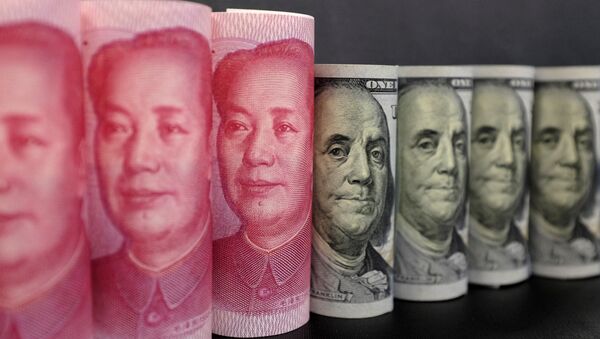Russo-China bilateral trade increased to an all-time high in 2018, reaching $108 billion, while the countries' energy cooperation is gaining steam with the Power of Siberia gas pipeline expected to become operational in December 2019. In addition, China is continuing to invest in Russia's liquefied natural gas projects.
During Chinese President Xi Jinping's visit to Moscow on 5-7 June, the countries signed a number of intergovernmental agreements on expanding the use of the rouble and the yuan in bilateral trade.
Earlier, in April 2019, the Russia-China Investment Fund (RCIF), and China's Suiyong Capital and Dazheng Investment Group launched a Russian-Chinese joint yuan fund targeting 6-7 billion RMB with a focus on infrastructure. The fund aims to bolster economic cooperation between the countries.
Simultaneously, Moscow and Beijing are gradually reducing their US Treasury holdings, shifting to gold as a hedge amid a US sanctions spree and looming global economic instability.
Under these circumstances the countries' shift to the rouble and yuan makes perfect sense, says Donald Gasper, an independent Hong Kong-based analyst who is a regular contributor to various media.
Sputnik: The idea of Russia's issuing yuan-denominated bonds surfaced again at the 2019 St. Petersburg International Economic Forum (SPIEF). In December 2018, the Russian Finance Ministry expressed hope to place federal loan bonds in China’s yuan in 2019 after the initiative was shelved in July 2018. It was earlier reported that if the agreement is struck Russia would sell sovereign bonds in yuan through the Moscow Exchange, while China could start selling government bonds in roubles. What was the trigger for renewed interest in bond operations? What immediate benefits could these operations bring to Moscow and Beijing?
Donald Gasper: Russia first considered the idea of selling a yuan-denominated bond in 2016 and revived the idea in 2018. The trigger has been primarily the need to raise money to fund large long-term energy projects: Russia has of late emerged as China’s largest supplier of crude oil and plans are underway to supply it with natural gas, including liquefied natural gas. For this infrastructure is needed. These projects are huge, with investment needed totalling millions of dollars, and they are of a long-term nature. Up to now, both countries have relied mainly on the equity market and state subsidies to finance energy projects as private banks are reluctant to get involved in such projects. Russia and China now seek to leverage bond markets as an alternative source of funds.
Sputnik: The US-China trade war continues to escalate with the future of the bilateral trade deal hanging in the balance. Could China, in your opinion, resort to dumping US Treasury bonds in case Donald Trump continues to raise tariffs and crackdown against China's IT sector, most notably the country's telecom giant Huawei?
Donald Gasper: China overtook Japan as the biggest holder of US treasury debt in 2008. It now holds $1.1 trillion in treasury bonds. It did cut its holdings by $10.4 billion in March and is ready to sell some of this debt to moderate any decline in the value of the yuan. However, in my view China is unlikely to abruptly exit the Treasury market, which is deep, liquid and pays a positive yield. Where else could it park such assets? Any abrupt move on China’s part at present would carry the risk of triggering a fall in the value of its unsold holdings. China is more likely to wait till prices are higher before it exits US bonds.
Sputnik: What impact could the de-dollarisation effort of the People's Republic have on the internationalisation of the yuan? How could the Belt and Road initiative facilitate the de-dollarisation process? Can we expect the emergence of a multi-currency trade space in Eurasia?
Donald Gasper: It is too early to predict what might happen. The situation is complicated by the need to stem excessive capital outflows, even though this deters investors from conducting business in the yuan. But in the long term the international use of the Chinese currency is sure to increase as China continues to develop as the world’s largest consumer of energy. This is good as it will help make up for the global liquidity shortage due to the normalisation of monetary policy and the necessary restructuring of the US economy. However we should not expect the yuan to take over the role of the dollar in the near future.
The views and opinions expressed by the speaker and contributor do not necessarily reflect those of Sputnik.





